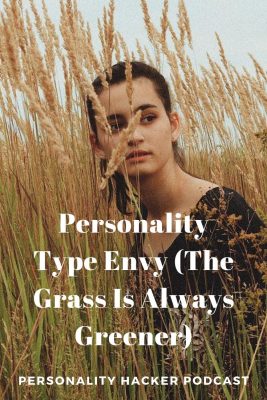Download Episode Here – right click link and select “Save Link As…”
In this episode, Joel and Antonia talk about dealing with personality type envy and the feeling that other types have it easier than you.
In this podcast you’ll find:
- Is it common to experience personality type envy?
-
Personality type envy between Introverts and Extraverts:
- Why “energy” can be a source of envy.
- How you move through the world matters.
-
What does the cost of specialization have to do with personality type envy?
- Does the other side really have it so easy?
-
Personality type envy between Sensors and Intuitives:
-
- Why does “presence” cause envy?
- Why do Sensors envy Intuitives’ pattern recognition?
-
-
Personality type envy between Thinkers and Feelers:
-
-
- How do emotions affect Thinker-Feeler envy?
- How does conflict play into this?
- Viewing information as “just information”, versus creating a “safe space”.
-
-
- How can societal biases influence what we envy?
- What do Joel and Antonia like about being a Feeler and Thinker, respectively?
-
Personality type envy between Judgers and Perceivers:
- Why the time period we live in matters.
- Listen to our podcast on the Graves Model (Spiral Dynamics) to hear more about the role institutions play in our development.
- How is your place in the group related to this dichotomy?
- How important is the meta narrative for you?
- How does the “rhythm of life” affect Judger-Perceiver envy?
- What does Joel love about being a Perceiver?
- Joel shares 3 words to help you deal with type envy.
To subscribe to the podcast, please use the links below:
Subscribe with iTunes
Non-iTunes Link
Soundcloud
Stitcher
Google Play
Spotify
Radio Public
PlayerFM
Listen Notes
If you like the podcast and want to help us out in return, please leave an honest rating and review on iTunes by clicking here. It will help the show and its ranking in iTunes immensely! We would be eternally grateful!
Want to learn more?
Discover Your Personal Genius
We want to hear from you. Leave your comments below…



Share:
Podcast - Episode 0288 - Being An ENFJ Man (with Denzel Mensah)
Podcast - Episode 0290 - Important Childhood Lessons For ExxPs and IxxJs
20 comments
“Feeling” in the Jungian context shouldn’t be conflated with emotions, but that does not mean they have no relationship to each other. One only has to lift their head from theory and observe people in the real world to see the relationship.
https://personalityhacker.com/are-thinkers-rational-and-feelers-irrational/
A
Just leaving a message to say: Feelings has nothing to do with emotions. Like nothing at all. This has been discussed again and again over and over and you perpetuated this misconception who knows how many times in this podcast. It is to do with values, ethics etc. and you aren’t helping anyone but implying that it is something else.
Hi, thank you for putting this blog. This is very relatable and I am gonna share it with my best friend she is also an ISFJ
List of things I envy as an NTP? (Am I an INTP with a lot of Ne or an ENTP with a lot of Ti? I’ve been learning mbti for several years now, and I know you’re supposed to choose, but I just gave up at this point since I get 50/50 for I/E all the time in tests? I think I’m just ambiverted. Hearing advice for both ENTPs and INTPs seem to help me both for some reason though.)
Things I Envy in Other Types as an NTP.
1. I envy Te users sometimes on their organizational abilities. At least FPs get a chance to develop Te later on, but most of my sense of organization comes from my Si. Basically, instead of creating my own logical system or standard for others, I find discipline with regular routines and habits to do my own thing. I often have to rely with what a lot of Te users suggest as a system to do, whether in education, self help books or personal connections I have because I can’t seem to create my own organized system on how to do things. It’s why I chose to go to college even if my Ne finds it exciting to go off doing things without it. I literally, just cannot organize myself without outside help, and surprisingly in summer vacation, I got frustrated with not having as much a strict schedule a school environment offers. My Si must be developing.
2. I envy Fi users actually. I am really bad at knowing what I’m feeling. Some Fi users get frustrated with me saying I’m being “fake” or “inauthentic.” Well, buddy, you take your Fi for granted. It’s not that I’m lying about myself, my Ti function hates lying of any kind (I find both FPs and TPs seem to value honesty more than FJs and TJs), it’s more like I’m just not self-aware of what I’m feeling in the first place. Come on. Just give me some time to understand what I’m personally feeling. Even TJs are better at me this oftentimes. I journal on a regular basis, and sometimes I vent out comments like this online because my Fe needs validation that this is what I’m feeling, and I’m not confusing my emotions with some other emotion.
3. I envy sensors sometimes. I honestly do get a high in exercising sometimes, not at first, but when it became such a regular routine that I find some comfort in it. I think my Si is kicking in. I find that exercises with a lot of unique movements such as dancing or team sports often scare me. Though if the exercise has a lot of repetitive movements such as running or lifting weights, I’m cool with that. It also seems to help vent out my anger sometimes, that I often don’t realize is there until I start exercising. If you’re a Si user and you’re not getting a high from exercise, maybe it just hasn’t become a routine for you yet, but that’s just me. I was always really bad with aim growing up, and I wish I could have been better at that stuff. I find my Si conservative tastes with clothes and how I decorate myself often make me mistaken externally for being a rather serious person, then you experience all my Ne randomness with all the projects are doing, and people scratch their head. When people imagine thrillseekers, they imagine Se users doing extreme sports or traveling around the world, but haha, I’m not that type of thrillseeker. But people who know me are pretty sure to call me that.
I guess that’s that, really. Oh well.
I’m not an INFP, but my advice for you is :
1. Search online “INFP blog”. Good luck.
2. Search online James Clear’s personal development blog — Likely an ESTJ. Te organizational advice everywhere.
3. Check out Lifehacker’s productivity advice on its website. As a fellow Ne user, I understand.
Interestingly there is also a similarly INTP blog for those interested (intpexperience.com) and if you’re curious.